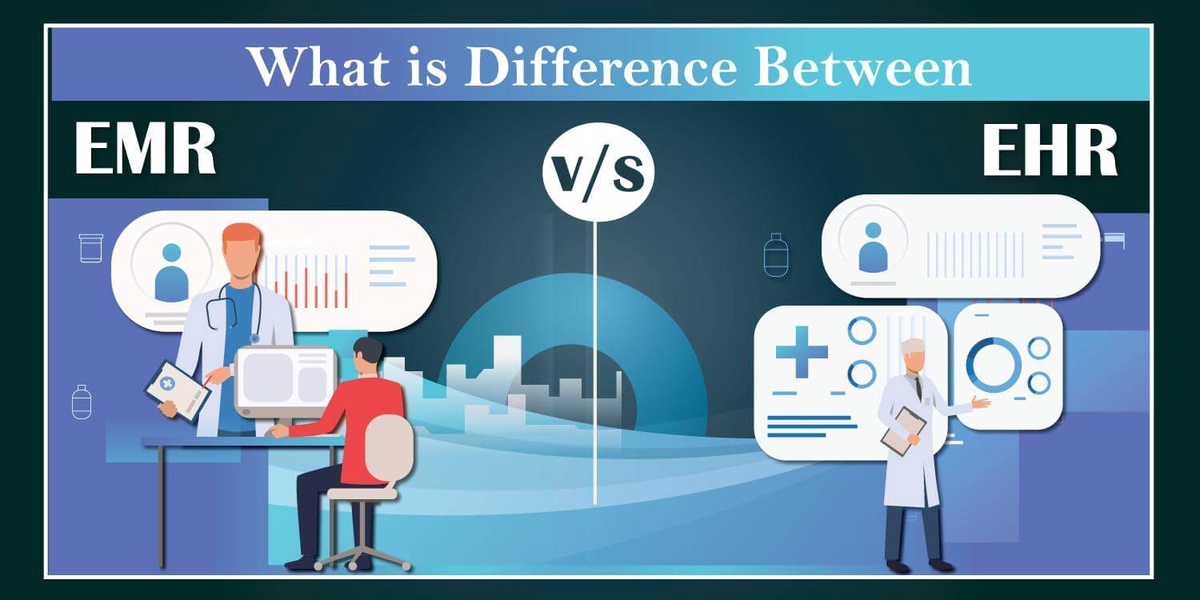The healthcare industry has experienced a revolution in recent years, especially after the covid-19. Since the healthcare industry is digitalized, Telemedicine software and health records are essential tools for doctors and health specialists. The global electronic health records market is expected to reach a valuation of over $40 billion by the end of 2024. At times, the terms “EHR and EMR” are used interchangeably. However, both are different from one another. Understanding the difference between EHR and EMR is vital for patients, healthcare providers, and specialists. If you’re eager to know how EMR vs EHR, you’ve landed on the right page. Here we go!
Understanding the difference between EMRs and EHRs is important for healthcare providers, patients, and anyone interested in the digital transformation of the healthcare industry. In this blog post, we’ll explore the key differences between EMRs and EHRs and why they matter.
What is an EMR?
Electronic Medical Records abbreviated as EMR meaning medical are electronic versions of the documents or charts placed in the physician’s clinic. The data are not shared outside the clinic premises. These are mainly utilized for the diagnosis and treatment of the patient’s care.
It may include paper records, medical conditions like medical records, diagnoses, medications, allergies, immunization dates, etc. The treatment aspect is quite inappropriate somewhere as the data doesn’t easily go off the practice place. In some cases, the PHI has to be printed or mailed to the respective authority for treatment.
- It traces data over time
- It can easily track which patients are still due for preventive screening and routine checkups.
- The reports can explain, how well a patient’s data is going on the prescribed treatment.
- It facilitates all the cure and diagnosis parameters.
What is an EHR?
EHR first stands for Electronic Health Record mechanism. This is also an electronic way of representing the patient’s information, other details, etc. to the respective person. The information is generally in the form of snapshots. It holds many great benefits that are discussed below:
- It simplifies the sharing of updated & and real-time information.
- Helpful in decision-making and offering authentic treatment.
- This gives a detailed account of the patient’s medical history condition like allergies and radiology images to the concerned lab result.
The technology also provides a patient portal that enables improved patient care to enter their medical conditions from any corner of the world. Telemedicine solution for patients allows doctors to gain access to PHI in the emergency rooms. These were the definitions of EMR & EHR terminology. Now comes the differentiation between the two. Read all the details with full concentration.
What is the difference between EMR and EHR?
The terms EMR (Electronic Medical Record) and EHR (Electronic Health Record) are often used interchangeably, but there are subtle yet important differences between them. Here's a breakdown:
Scope of Information:
- EMR: Primarily focuses on a patient's medical history within a single healthcare provider's office or practice. This includes details like diagnoses, medications, lab results, and doctor's notes.
- EHR: Offers a broader view, encompassing a patient's complete medical history across various healthcare settings they've interacted with. It may include information from hospitals, specialists, emergency rooms, and even pharmacies.
Data Sharing:
- EMR: Primarily designed for internal use within a single practice. Sharing with other providers may be possible but often requires manual effort and isn't always standardized.
- EHR: Built with interoperability in mind, allowing secure and standardized electronic exchange of patient data between different healthcare systems. This facilitates more coordinated care and reduces the risk of duplicate tests or medication errors.
Focus:
- EMR: Primarily used for clinical care activities, like diagnosis, treatment planning, and managing patient conditions within a specific practice.
- EHR: Aims to support a wider range of healthcare functionalities, including population health management, research, and patient engagement.
Examples:
- EMR: A dentist's electronic record of your dental history, including treatments, X-rays, and allergies.
- EHR: A comprehensive record of your health history across different providers, including hospital stays, specialist consultations, and lab reports from various facilities.
In Essence:
- EMR: Think of it as a digital version of a traditional paper chart within a specific practice.
- EHR: Imagine it as a more comprehensive and interconnected medical history accessible across various healthcare settings.
While both EMR and EHR are crucial for modern healthcare, understanding their distinctions helps you grasp the nuances of how your medical information is stored and shared.
Advantages of EHR
Here are the advantages of EHR:
1. Improves quality of care
You get easy and quick access to patients’ personal and health information through the EHR systems. It gives doctors a detailed idea about patients’ health conditions. It allows them to make informed medical decisions. According to a report, more than 45% of patients revealed that EHR systems in healthcare have improved the quality of care.
2. Increases efficiency
EHR systems in healthcare significantly improve organizational efficiency. Besides this, there is evidence stating that EHR promotes a positive ROI. EHR systems streamlined major administrative processes, including appointment scheduling, billing, and patient communication.
3. Improves patient engagement
EHR systems build a collaborative environment among specialists, doctors, and patients. It also establishes transparency for patients; as a result, patients can securely share their personal information and engage with health experts.
4. Reduces medical errors
Errors in the healthcare industry are common. Since patients have easy access to their allergies, medical history, and existing medications, it minimizes the chances of conflicts and errors. This ensures that doctors make better recommendations, ultimately improving patients’ health quickly. According to a report, medical errors cost $20 billion annually. By implementing EHR systems, the cost can be reduced.
Advantages of EMR
Here are the advantages of EMR:
1. Enhanced patient care
Other than paper records, EMR systems allow healthcare providers to examine patients’ information in different ways. This enhances the overall patient experience and promotes positive health outcomes. The system also bridges the gap between patients and doctors, establishing a solid relationship.
2. Data security
EMRs feature in-built security systems designed to safeguard medical data from unauthorized access. This reduces the chances of data breaches and malware activities.
3. Better communication
EMRs promote secure online appointment scheduling and messaging, ultimately improving the communication between doctors and patients. This also reduces the wait time, saves money, and improves the overall patient experience.
4. Financial benefits
EMRs also provide financial benefits as these systems save money and time by allowing health experts to access your medical records quickly. Patients can also manage their personal health effectively as it gives them access to their health information.
Summing Up
EHR and EMR systems in hospitals have become the newest trend. These systems are designed to save a lot of your time and money. Although both these seem similar, they have differences that set them apart. This article discussed the difference between EHR and EMR in detail.
A user or healthcare provider who is seeking to set up one of the two can find these details beneficial. VCDoctor has a list of perfect solutions for you. We help healthcare providers unleash their full capacity to treat patients’ information through telemedicine by delivering them sophisticated telemedicine solutions. Feel free to get in touch with our experts to learn more about the Difference Between EHR and EMR and more.
Original Blog Source: https://www.vcdoctor.com/blog/difference-between-emr-and-ehr/


No comments yet